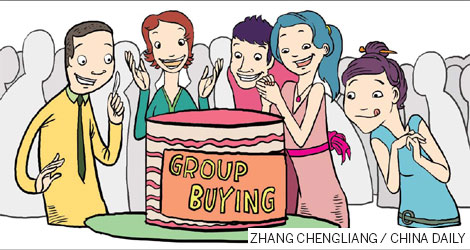Netizens share bulk discounts with tuangou
Beijingers have long been known as excellent bargainers, and tuangou, or group buying, is Internet commerce with a Chinese twist.
 |
|
Netizens share bulk discounts with tuangou |
Acting on the principle that more units you buy, the cheaper the price should be, Chinese consumers are gathering online in locally and nationally based websites to organize group buys, saving thousands of yuan on big items like cars and home furnishings, and getting ultra-discounted tickets to concerts and tours.
And Beijing is right there in the thick of it, providing massive discount on services and products. Some jokers are even selling tickets to Noah's Ark and while they aren't cheap, they are offering a 10 percent discount off the 10 billion yuan price.
Though China has the largest number of Internet users in the world, e-commerce has been slow to take off, at least until the rise of sites like Taobao.com. Chinese consumers are suspicious of the quality of items they haven't examined and worry they won't receive proper after-sales service. Tuangou gives consumers greater leverage should the seller need to be pressured to provide warranty services.
"Without doubt, it's a new big thing for Beijing Internet users," said Rebecca Chow, managing director of TransChina Media, a firm that specializes in Chinese social media.
Group buys are traditionally organized in Internet forums about a particular product. For example, a poster in a forum for a particular car would ask others to come together to buy that vehicle. Once enough members joined the group - typically twelve to fifty depending on the item - the team leader would approach the dealer and negotiate a reduced price. After the terms of the deal are agreed upon, the buyers gather at the dealership, often meeting in person for the first time, and pay for the car. It is not uncommon for these groups to remain intact after the sale.
Being a team leader can be a lot of work, so group-buying websites have sprung up, serving as agents between buyers and sellers and receiving a commission from the sale. However, a company's commission can put a dent in the discount buyers receive.
For electronics such as cameras, savings can be less than 100 yuan. Since buyers pay and collect the items in person, sales need to be local. However, Chow said this is changing: "I believe distance is not a major problem as more and more people use online banking."
At present though, proximity is still a major factor when it comes to choice. Websites like nuomi.com and aggregator site 1000tuan.com both offer Beijing specific subsections with dramatic savings on restaurants and services. A quick glance shows 621 people have bought meals at a hotpot restaurant for 75 yuan so far, down from 245 yuan, while older records show that a massive 152,160 people bought discounted tickets to Beijing's Jackie Chan Cinema. All the deals have deadlines for purchase, indicated by clocks counting down, which add a touch of pressure.
Group buys also only work if it's a generic item. Coffee tables work, curtains don't. Silver, a sophomore at Beijing's Capital University of Economics and Business, often buys things online, but has yet to use tuangou.
"The things I are already quite inexpensive; buying with tuangou wouldn't make them much cheaper," she explained. Since Silver's online purchases are generally under 100 yuan and range from accessories to food items, "it would be difficult to find a group of people who all wanted the same thing."
Sellers also need to be willing to negotiate; many agree to group buys for PR reasons rather than economic ones. Companies such as electronics manufacturer Gome are also getting in on the deal, encouraging customers to set up their own groups to participate in bulk buys.
Increasingly, group buys are focusing on cheaper items and moving beyond physical products into services.
"The consumed goods can be anything. From a T-shirt or movie ticket to a spa," said Chow.
Group buy sites are targeting younger, less wealthy consumers by offering food items, restaurant details and discounts to KTV parlors.
Though tuangou companies have been launched in other countries, most notably Groupon in the United States, which now has a Chinese clone (Groupon.cn), they have failed to achieve the success they have in Beijing. The strength of this city's forums, combined with the love of bargaining, have made this a form of e-commerce with unique Chinese characteristics.
 0
0 







Go to Forum >>0 Comments